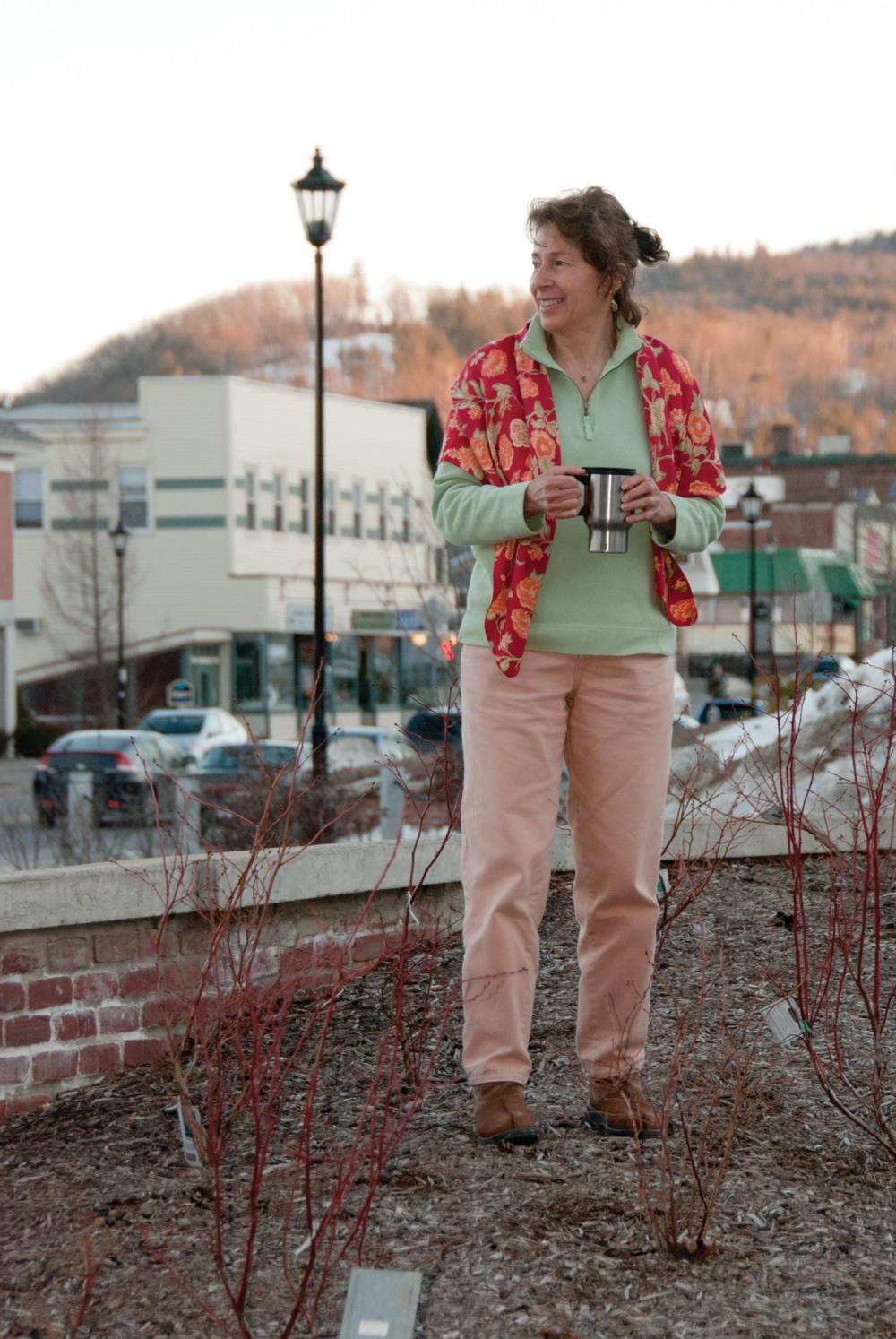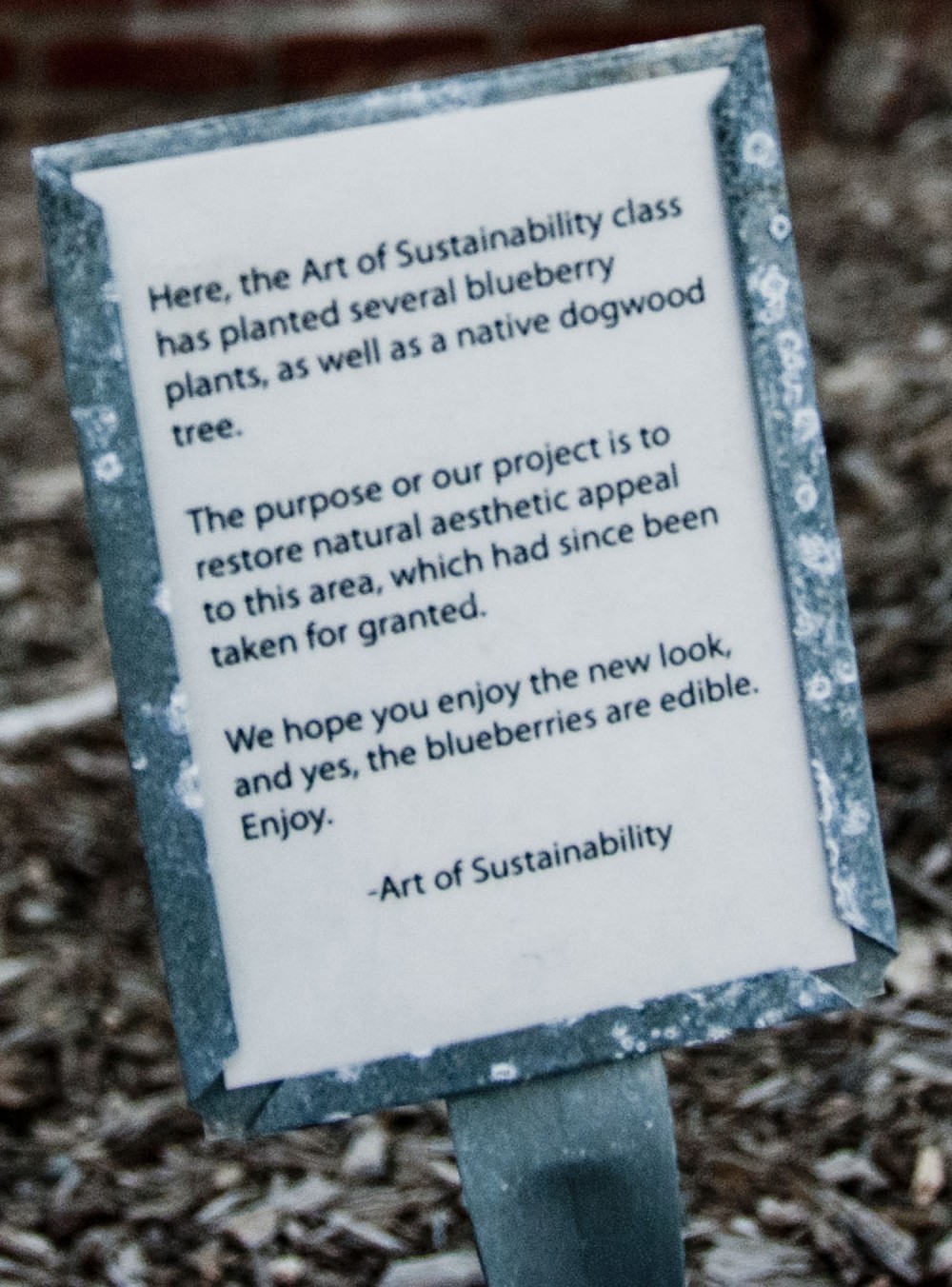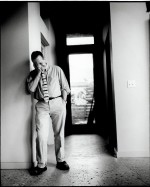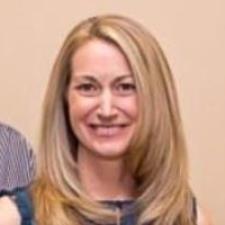 Post Classifieds
Post Classifieds
The Art of Sustainability
An interview with Carol Jowdy
How many times can you re-use a plastic water bottle? Once? Twice? Maybe three times before it is altogether forgotten about and joins the swelling community of retired bottles, bags, and other shiny treasures of our landfills and oceans? Or do we have the power to immortalize that expendable plastic bottle?
"I once saw a piece of student artwork, a mobile, which was made up entirely of the bottoms of plastic bottles," said Carol Jowdy, who designed and teaches the course The Art of Sustainability at Plymouth State University. "All the colors caught the light of the sun. It was so beautiful."
Jowdy's class, The Art of Sustainability, focuses on bridging the gap between environmental science and the arts to raise consciousness about environmental issues and to advocate sustainable living. "We encourage sound and sustainable living through the portal of art, use art as our voice on these pressing issues to question the way we live," she said.
Jowdy, who runs her own landscaping company, Carol Jowdy Landscape Design, considers herself "a very sustainable and conscious person." Her background in the arts has seemed to marry perfectly with the notions surrounding sustainability and recycling products, as she encourages students to see what one would instinctively discard instead as a piece of something larger and beautiful.
Jowdy herself implements this philosophy into her everyday life. She has long been saving the paper tags that come attached to tea bags (she puts the used tea satchels in her compost pile). "Each one has its own shape and design, and they're just so colorful," she said. Though she hasn't quite decided what to use them for, she sees their potential as being part of something much more aesthetically pleasing and ecologically friendly than pieces in a landfill.
Her students tackle the mounting issues associated with wasteful living by re-thinking the way they can use typically discarded or forgotten about objects like plastic bottles, assorted papers, bags and boxes. "A student of mine once made a bunch of purses using the bottoms of plastic juice containers," she said, remarking that they were just as chic as they were sustainable. The designs on the bottoms of the juice bottles that typically go unnoticed served this student's purpose extremely well, as they were all unique and picturesque.
Her students took part in a collaborative project last spring to put these sustainable philosophies into practice on a larger and more impacting scale. The fruits of their efforts are available for the entire community of PSU to see and savor at the bottom of the hill by the Draper & Maynard Building, where the class spent weeks cleaning, tilling, and transforming a small plot of land.
"The students noticed that there was this space of land by the wall where kids would sit and smoke and then throw their cigarette butts. The land was being defamed and completely taken for granted. So," she said, "they decided to do something about it." The class spent a great deal of time and care cleaning the butts and trash away from the plot. They broke the packed down soil, turned it, tilled it, and restored its fertility. They planted several blueberry plants and a dogwood tree to "restore the natural aesthetic appeal to this area, which had since been taken for granted."
Why the need for such a course here at Plymouth? "I believe in future generations," said Jowdy, "and in assuming responsibility for your actions. We've done so much damage to the earth. It's time to start advocating the necessity for sustainable living. And what better place to spread the word than at a university?" Especially, if I may add, at so beautiful a university as PSU.
Jowdy offers some sound advice for making the first steps towards a sustainable lifestyle: Carpool. Drive less. Ride a bike. Turn your lights off. Grow your own food, or at the very least be mindful of buying food with excessive packaging. (Every little bit of material, every plastic wrapper or bottle cap or cardboard lining means energy and, eventually, waste.) "And don't buy water! It's free!"
Get Top Stories Delivered Weekly
More theclockonline News Articles
Recent theclockonline News Articles
Discuss This Article
MOST POPULAR THECLOCKONLINE

Campton Elementary School 8th Grade Silent Auction & Spaghetti Dinner By Rebecca Tgibedes

Will You? By Isabelle Elsasser

Summer in the Sunflowers By Emily Holleran

Student Spotlight: Sabrina Siegel By Justine Walsh
GET TOP STORIES DELIVERED WEEKLY
FOLLOW OUR NEWSPAPER
LATEST THECLOCKONLINE NEWS
RECENT THECLOCKONLINE CLASSIFIEDS
OUTSIDE THE LINES
- A Story To Sing About
- The Gap in Gum Care: Why Caring For Your Teeth’s F...
- Top Tips for Signature Scents and Better-Smelling Laundry
- A Dog Trainer’s Top Tips to Support Pets Through Life S...
- Clear the Air of Indoor Pollutants This Spring
- Stroke & Dementia in Black Men: Tips for Staying Healthy...
- Hispanics and African Americans at Higher Risk for Eye...
- African Americans at Higher Risk for Eye Disease
- Infinity Kings: Final Book In A Favorite Fantasy Series
- What You Need To Know About Keratoconus and the iLink...
FROM AROUND THE WEB
- 7 Reasons Renting an RV Should Be On Every Family’s S...
- Don’t Let Diabetes Shortchange Your Golden Years
- No Child is Forgotten By Marine Toys for Tots
- Sweeten Your Springtime Salads With Healthy Chilean Grapes
- Young Author Translates 4,000-Year-Old Text to Reveal...
- Keeping Cool and Energy-efficient Amid America’s “...
- Addressing Sarcopenia with a Healthy Diet
- Subway’s New Wraps Elevate Eating on the Go
- Family Teacher Conference Topics Beyond Academics
- Youth Take Down Tobacco
COLLEGE PRESS RELEASES
- Shoff Promotions Comic Book & Sports Card Show
- Semiconductor Research Corp unveils 2024 Research Call, $13.8M Funding
- Charles River Associates Opens Second Scholarship Cycle, Expands to the UK
- BLUMHOUSE AND AMC THEATRES LAUNCH FIRST-EVER HALFWAY TO HALLOWEEN FILM FESTIVAL
- THE GEN Z IMPERATIVE: LISTEN TO FEELINGS AND GIVE GEN Z A VOICE










